Legendary Comics’ Annihilator is writer Grant Morrison and artist Frazer Irving‘s most recent collaboration, having worked together previously on titles such as Seven Soldiers and Batman and Robin. Deadshirt writers David Uzumeri, Dom Griffin, and Jason Urbanciz sat down to discuss and debate the first three issues of this “original graphic novel odyssey” in the first of a two part conversation about the comics mini-series.
Dominic Griffin: We can pretty squarely place Annihilator as the most Hollywood thing Grant has ever done, right? And not just because of the setting or the protagonist being a screenwriter. It legitimately feels like the byproduct of his experiences in the film industry, which maybe accounts for why it’s so alternately frightening and hilarious.
Jason Urbanciz: Oh yes, definitely. I still go back and forth between it being a recycled screenplay or just a reaction to his years in Hollywood.
David Uzumeri: Unquestionably, and the characters in the book are definitely based off of Hollywood types in his circle—I can’t speak to Ray Spass, but for the love of God, Max Nomax is the spitting image of Max Landis.
Jason: I didn’t make the Landis connection. He feel like Tom Cruise to me.
Dominic: I wonder if the Landis likeness is a fun, cute reference or if Morrison sees him as the physical embodiment of Tinseltown toxicity.
David: I think the “recycled screenplay” concept doesn’t hold water, personally–first off, because Morrison isn’t the type of dude to BS it and say it wasn’t when it was, and secondly, the entire sequence in #3 with the existing publication of Max Nomax stories is something I don’t think would have worked as well on screen. It’s not just about Hollywood, but about the way Hollywood feeds off of and recapitulates print media, as well.
Dominic: Yeah, like a horror story about IP.
David: It’s hard not to process this through the lens of the Morrison/Landis interactions at MorrisonCon, and Landis himself tweeted with excitement that he was in Annihilator, so I think the truth is probably somewhere in the middle.
It’s the kind of story where the length and format are important as a sort of re-mapping of the Hollywood screenplay template. It’s no coincidence that Makro is introduced into the modern-day narrative at the exact one-third mark.
Jason: This one panel seems to sum up Morrison’s thoughts on Hollywood.
Dominic: Accurate. Everything about the plot and structure feels like a Hollywood pitch from Hell, down to the buddy cop chemistry between Ray and Max, but presented with a purely comic book-y execution.
David: That’s a great call about the buddy cop chemistry. The thing about the book, though, is that I seriously can’t tell if it’s an indictment or a celebration, or both. As much as it mocks the entire Hollywood system, there’s a sort of weird appreciation of the way it enables and allows bizarre artists to earn tons of money and live completely hedonistic lifestyles. As much as he’s displeased with it, there’s something presented as inherently romantic about it.
Dominic: In Supergods he talks about Batman ’89 helping Arkham Asylum‘s sales and making him briefly rich, so it’s probably a bit of both.
Jason: On top of that, Irving puts together these amazing sci-fi vistas bring to mind stuff like Prometheus and Alien. Amazing art that can only exist due to big-budget mass market filmmaking.
David: Oh man, yeah, we’ve gone a bit here without talking about this being the work of Irving’s career. This is taking the entire narrative cadence they developed in “Batman and Robin Must Die!” (Batman and Robin #13-15) and expanding it to a new level, even with a lot of the same thematic elements: the dark contract, the black hole, the dealing with loss.
Dominic: Not many artists could switch gears that way. (Effectively, anyhow.) Irving is great here, particularly in the way he excels at both the Gothic space imagery and the great character acting in the straight-up dialogue heavy scenes.
The crux of the premise, that Ray’s tumor is really this sci-fi MacGuffin, reminds me of the Kathmandu incident. [Editor’s Note: in his book Supergods, Morrison describes communicating with extra-dimensional beings while visiting Nepal in 1994, an experience that has influenced all of his work since. Whether you believe it or not, it’s a pretty fascinating read. -Dylan] Everyone tells Grant he was just on drugs, but he places it in a different context, as this seminal moment in his life, and it led to all these great opportunities. Just the notion of a writer’s block and cancer being this thing to beat is Peak Morrison.
Jason: That the cancer in Ray’s brain is literally a story he must get out…
David: Which, again, ties back into one of the central themes of his Batman run, which was the idea of processing trauma into benevolence and using it to improve yourself. And hey, we can’t ignore Irving’s Bill Sienkiewicz-esque surrealistic flourishes he throws in whenever Ray’s having a seizure.
Dominic: It’s like the central tenet of the Church of Morrison. It’s unfortunate that people have turned him into a faux Messiah post All Star, but that key, aspirational theme has such curative power.
David: This is definitely Morrison’s strongest creator-owned work in quite a while and his first since, I think, The Filth that’s really presented the fact that he can actually write everyday Earth life pretty damn well, too. Well, except for the much-maligned first issue of his Authority run.
Jason: There’s a lot of Sink in those Nomax pulp pages we glimpse too. Is there something behind this story of “I’m not trying to heal the world, just heal myself by exorcising this one story?”
Dominic: That’s interesting, Jason. Fits with the sort of self-centered Hollywood shit. Depending on where it goes, it could become “by healing myself, I can heal others with the product of the exorcism,” although at this point it’s hard to imagine the script Ray’s writing concluding on an aspirational note.
Jason: Can Ray save himself? Nomax is not the hero here, and cannot be trusted.
Dominic: One of the weird things here is how Nomax is a big scoundrel, but Ray isn’t much more likable. And Max has the excuse of being a something of a fictional construct. It’s Ferris Bueller’s Day Off if Cameron was also an asshole.
Jason: Yeah, Nomax has the benefit of being charismatic. Ray’s just kind of a schlub.
David: There isn’t a heroic character anywhere in this book, but there are sympathetic characters. I think that Spass and Nomax’s vanity and egotism are very understandable and relatable, it’s just that they relate to the parts of myself I feel shitty about.
Jason: I mean, Ray’s ex has a restraining order against him.
David: Yeah, that definitely stuck out to me too.
Dominic: Agreed. Which, again, could make a third act catharsis even more resonant. Those negative traits their own little cancerous tumors. Even the supposed hero character in the script seems like the Terminator.
Jason: Nomax is trying to resurrect Olympia, to atone for committing the “Ultimate Crime.”
David: I’m very interested to see where the Olympia/Luna thing goes, honestly. Olympia’s dead and Max wants to resurrect her, but Ray’s ex is just dead to him because he’s a creepy piece of shit.
Dominic: Oooh. Yes.
Jason: Meanwhile, we still have yet to meet the dragon in the space station. And that damn creepy bug-eyed bear is gonna do something.
Dominic: I’m very curious to see how much of that becomes Ray tacitly working through his own issues by interacting with his creations and how much is “No, Max Nomax is real and this shit is serious.” Hopefully it’s left ambiguous. Also, That Bear is the character find of 2014. That Bear and the dog from John Wick need their own book.
Jason: Yeah, so far no one has interacted with Max without Ray being in the same room. Well, the Feds treated them as separate beings but that could still be a fake-out.
David: I’m pretty sure it’s all real; this isn’t like Happy! where there was meant to be a hint of ambiguity. (It’s also not like Happy! in that it’s on par with Morrison’s previous work.)
Dominic: I REALLY loved Happy!.
Jason: I still haven’t finished Happy!.
Dominic: Of all of his comics it also would be the easiest to adapt to film.
David: Happy! didn’t work for me at all, but maybe it’d benefit from being revisited? I do know that the RZA is supposedly directing an adaptation.
Dominic: I dug it as a big letter to everyone in comics making violent, vulgar books, and the negativity of internet trolls. It should have opened like 500 Days of Summer but with a note about Mark Millar.
Jason: Guess I know what I’m reading this afternoon.
Dominic: Annihilator is a little bit more in his usual wheel house, where Happy! felt like him house sitting. Like an artist covering another artist.
Jason: Annihilator feels like a lot of his DC work in which the comic story is a living thing, except now it’s a screenplay.
David: Can we talk about the Mark Millar bitterness in Annihilator as well? I don’t think it’s unimportant that his greatest disciple-gone-wrong has become a Hollywood hit-making machine while Morrison can’t get a single screenplay made.
Jason: “Hit-making” is a little strong, but he does keep getting the heavy option dollars and the occasional movie.
Dominic: Happy! DEFINITELY feels like an angry breakup song about that entire deal, whereas here he’s almost making peace with Hollywood.
David: Well, Morrison gets the option dollars too, but Millar’s gotten two Kick-Ass movies made, Wanted, Kingsman…
Jason: Kingsman, which is notable for getting booted from Summer to the February wastelands. I still have never read Morrison’s other Hollywood thing, Dinosaurs vs. Aliens, which seemed to get hyped for years and then dropped quietly.
David: I’ve read it, and it’s weird. It’s maybe three issues worth of content at most, ends on an end-of-act-one cliffhanger, and then is likely never going to come back. It’s weird how Morrison’s creator-owned output has changed pre- and post-his return to DC, and the reaction to it. Even Happy! and Annihilator seem to have dropped with little fanfare, while We3, Vimanarama, and Seaguy were Big Deals.
Dominic: Multiversity is just overshadowing everything, I think. I think those books offered strong counter-programming if you were tired of cape comics. Now the cape comics he’s doing are themselves the counter-programming.
Jason: There was a time when Morrison was DC’s guiding force and now he’s like Claremont getting an X-Men book for old times’ sake while Johns rules the roost. (I’m not saying Multiversity isn’t high quality, just he’s the old guy in office now.)
David: I don’t know if THAT’S quite the case; I think Johns is recapitulating himself way more than Morrison is, and Johns is also more separated from the rest of comics culture. You at least get the feeling that Morrison is reading other people’s stuff. Johns seems to have hermetically sealed himself entirely.
Dominic: Yeah, I can’t picture Geoff Johns reading Sex Criminals. You get the vibe Grant at least knows what’s happening elsewhere.
David: Yeah, exactly. Multiversity and Annihilator, more than Claremont’s books, feel like comics in 2014, not comics from 1994 with 2014 production quality.
Jason: Which is weird because Multiversity was mostly written five years ago? A lot of these scripts have been locked for years. Stewart was done drawing his issue at least a full year ago.
David: Morrison’s stated that he definitely felt a bit of pressure from other comics to get his stuff out before other people did it first, explicitly shouting out Hickman’s Avengers as well.
Jason: Morrison’s got Multiversity and that Wonder Woman OGN still in the pipe at DC. I do wonder if that’s it for him (except for Seaguy 3) over there.
Dominic: I do think Grant did more rewriting on those than other projects, and I imagine Annihilator is the same way. Removed from the monthly grind, his style is evolving.
David: That’s absolutely a lot of it as well. This is the first time in his career, I think, he’s started really writing for the trade.
Jason: Annihilator feels like a complete work that is being serialized, but the Multiversity books feel like the most complete single issues I’ve read in years.
David: Still, though, they feel labored over in a way that, say, Invisibles doesn’t. I think Flex Mentallo, All Star Superman, and The Filth are probably his least improvisational books up until this era, but now EVERYTHING feels like it has that level of pre-planning.
Jason: Multiversity has the air of his final word on DC to it. Like he’s refined his Seven Soldiers and Final Crisis ideas to their final form. Annihilator feels immaculate, like it’s already in its final form on the first try.
Dominic: Exactly. He’s now at this craftsman level in his career where everything he does is going to be stupidly polished.
David: That’s very fair, and Final Crisis, especially, has been heavily revised since first publication. The trade you can get now is a very different animal than the nine issues we bought in the store in 2008. Also interesting: it’s fascinating how impossible it is to discuss a work like Annihilator, or any of Morrison’s comics, without it turning into a discussion about his career and place in the industry, since it’s such a thematic touchstone in all of his work.
Jason: Multiversity feels like he learned from that experience. Like he wasn’t going to release something incomplete/needing revision again.
David: Annihilator‘s the same way, while I understand the Happy! hardcover had revisions itself and extra pages. Batman Incorporated vol. 2 is having entire pages redrawn for the Absolute.
Dominic: It reminds me of how modern music critics can’t discuss Kanye West without discussing ALL OF MUSIC.
Jason: Oh yeah. He encompasses everything comics want to be. Which brings it back to Annihilator, where Ray is just trying to bang out a shitty screenplay even he can’t describe except in elevator pitch form while Nomax is trying to save (maybe) the world.
Dominic: Perhaps Max is going to bring some scope and perspective to Ray’s tiny little world of cocaine and call girls.
Jason: Is Ray the person Morrison thought he’d have to become to work in Hollywood? Is Ray Millar?
David: I don’t know if we’re going to get Optimistic Morrison here, though. I’m expecting something meaner at the end, or at least Pyrrhic. I can’t imagine we’re going to get Ray and Luna’s tearful reunion, then Max going “my work here is done!” and ascending into the heavens after convincing Makro to rebel.
Jason: No, everyone dies at the end, I’m sure.
David: Considering the Landis/Nomax parallel, I think Spass is probably either a real screenwriter or an amalgamation of a number. I think Morrison’s said a few times this is one work he’s done where there isn’t an authorial stand-in; there’s no King Mob or Leo Quintum here, it’s just Morrison telling a story about OTHER people. Which, again, is a sort of new vibe for him. I mean, the closest thing to a beloved childhood pet so far is the teddy bear.
Dominic: I think Ray Spass is a mixture of that Hollyweird indictment and a little of the guy he was when he first got big. That evil thing inside every beta male that is like “once I have the money and the girls I no longer need to be a decent human.”
Jason: “Make yourself useful. Swap that knife of yours for a gun.” Teddy Bear With A Gun is the greatest character. And yeah, the whole orgy scene basically communicates “this is a poisoned human being.”
David: Yeah, that wasn’t a lonely dude who wanted companionship, it was a coke- and sex-addict going on a binge. Either way, I think this is Morrison’s best creator-owned work since that initial post-Marvel/Vertigo push, and I’m super sad to see it being, well, not ignored, but sidelined, due to it being a Legendary title. It’s a seriously well-crafted work by a master of the medium and one of its most promising wunderkinds. I really hope this isn’t the last we hear of Morrison and Irving working together, since they’ve got a fantastic chemistry, the likes that Morrison has with Quitely or Burnham or Stewart.
Jason: Yeah, if this was coming from Image it would be a much bigger deal. Irving has been one of the best artists that no one talks about for years.
Dominic: It’s something of a coming out party for Irving, yeah. We’re only at the halfway mark, so it’ll be fascinating to see where the remaining issues will go, and whether or not this will start to get some of the attention it deserves in trade form.
Annihilator #4 is out today from Legendary Comics. Look for part two of our roundtable discussion in February.

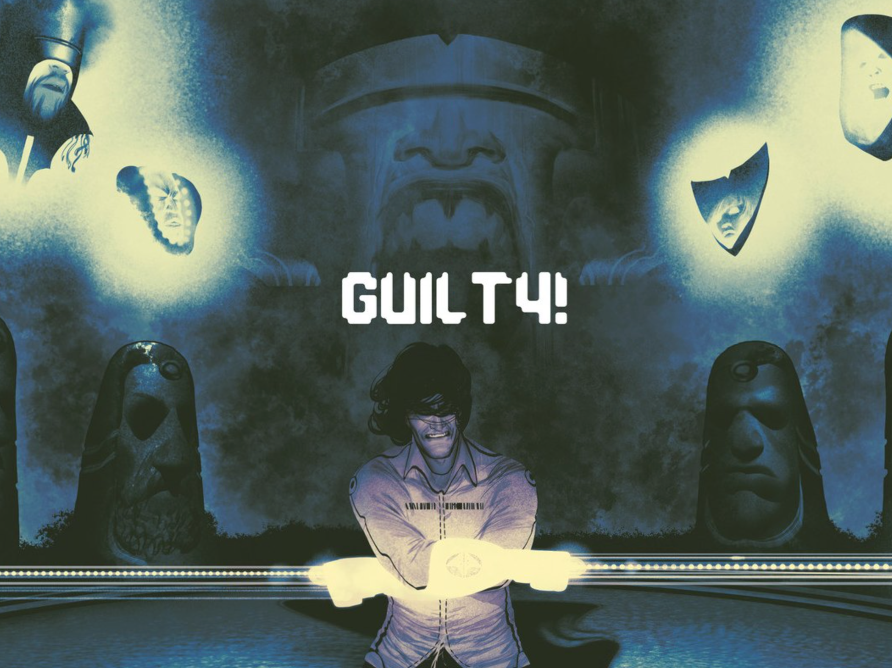
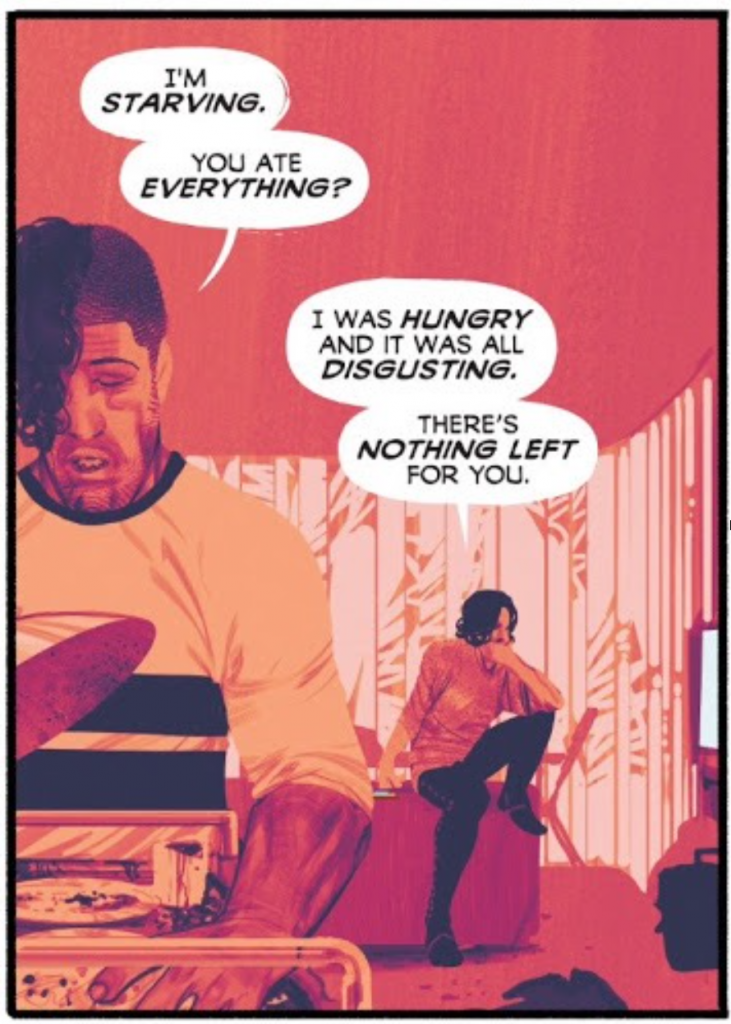
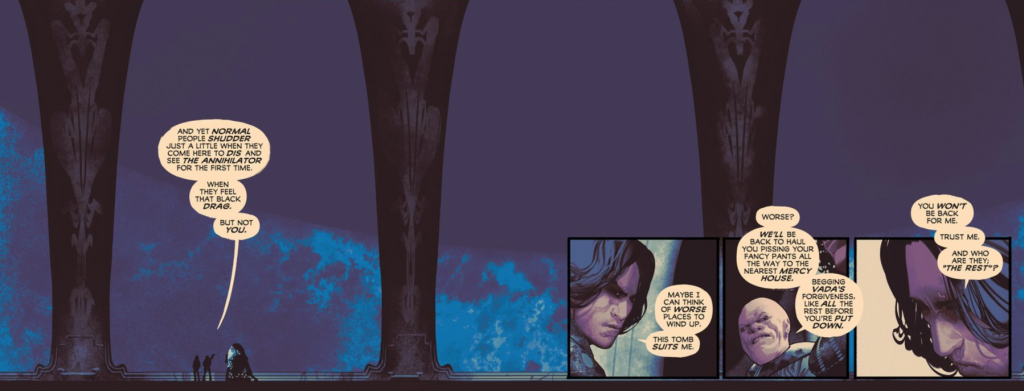
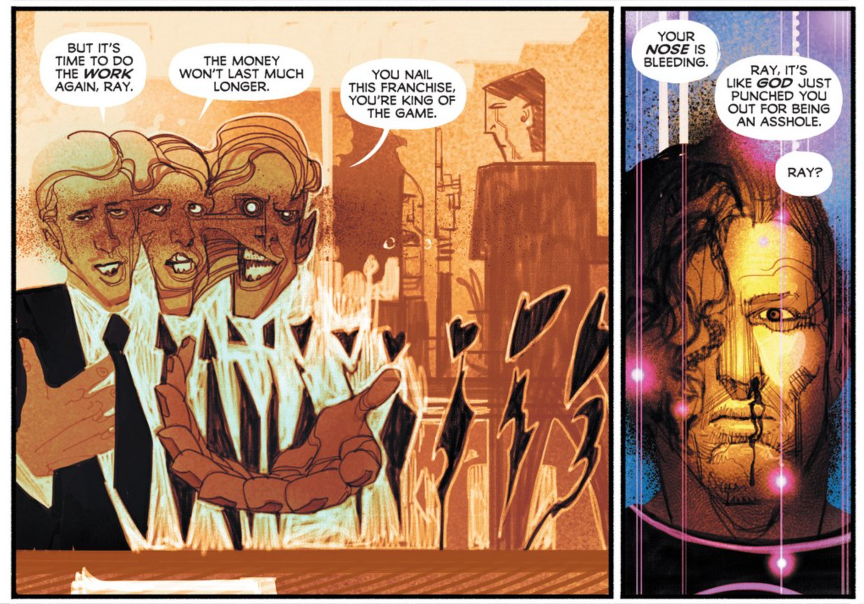
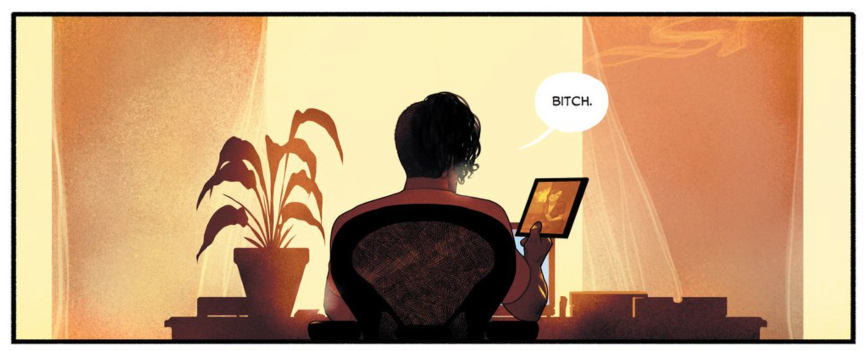

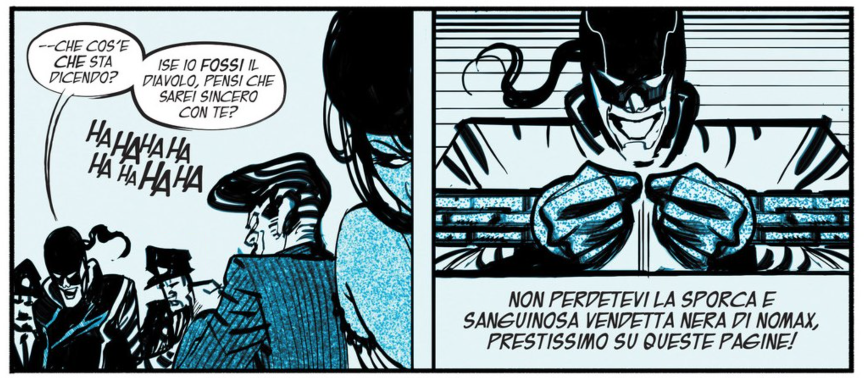
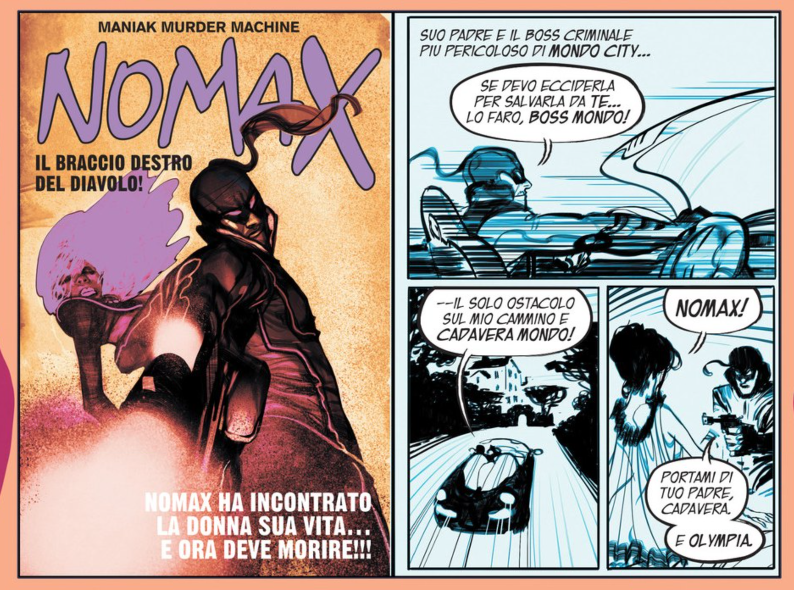


I always thought that Ray Spass and Max Nomax were supposed to resemble Tim Burton and Johnny Depp respectively.